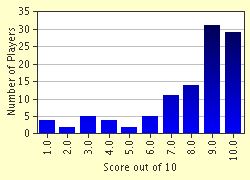Quiz Answer Key and Fun Facts
1. The adjective "BONA" means "GOOD". The suffix "--UL--" indicates a person having a given trait. "--O" is the ending for a noun. How would one correctly translate the Esperanto word "BONULO"?
2. The prefix "MAL--" indicates the direct opposite meaning of the root word. The adjective "BONA" means "GOOD". "--A" is the ending for an adjective. How would one correctly translate the Esperanto word "MALBONA"?
3. The prefix "MAL--" indicates the direct opposite meaning of the root word. The adjective "BONA" means "GOOD". The Esperanto suffix "--UL--" indicates a person having a given trait. "--O" is the ending for a noun. How would one correctly translate the Esperanto word "MALBONULO"?
4. The word "BONA" means "GOOD" in Esperanto. The suffix "--ET--" diminishes the meaning of a word. "--A" is the ending for an adjective. How would one correctly translate the Esperanto word "BONETA"?
5. "BONA" means "GOOD". The suffix "--EG--" augments the meaning of a word. "--A" is the ending for an adjective. How would one correctly translate the Esperanto word "BONEGA"?
6. The adjective "BONA" means "GOOD". The suffix "--EC--" indicates an often abstract quality. "--O" is the ending for a noun. How would one correctly translate the Esperanto word "BONECO"?
7. The word "BONA" is an adjective meaning "GOOD". The Esperanto suffix "--AĴ--" indicates a typically concrete thing. "--O" is the ending for a noun. How would one correctly translate the Esperanto word "BONAĴO"?
8. "PLI" is a word by itself (often used like a prefix) meaning "MORE". The adjective "BONA" means "GOOD". The suffix "--IG--" indicates causing to be. "--I" is the ending for a verb in the infinitive. How would one correctly translate the Esperanto word PLIBONIGI?
9. You can build a word is Esperanto using only the following clues: "MAL--" is a prefix meaning the direct opposite. "BONA" is an adjective meaning "GOOD". The suffix "--UL--" indicates a person having a given trait. The suffix "--IN--" indicates a word referring to a female. "--O" is the ending for all nouns. What is the Esperanto word for "A BAD WOMAN/GIRL"?
10. You can build a word is Esperanto using only the following clues: "RE--" is a prefix that means the same thing in English. The adjective "BONA" means "GOOD". The suffix "--IG--" indicates causing to be. "--I" is the ending for a verb in the infinitive. Using the information given, What is the Esperanto word for "TO REPAIR, TO MAKE (something) GOOD AGAIN"?
Source: Author
oofahlandian
This quiz was reviewed by FunTrivia editor
trident before going online.
Any errors found in FunTrivia content are routinely corrected through our feedback system.

